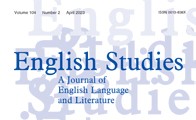Alexa Weik von Mossner has published a newl article entitled “Tracing Loss in Times of Rapid Climate Change: Figures of Absence in Omar El Akkad’s American War“ in the journal English Studies
Omar El Akkad’s American War (2017) presents a dark vision of what the United States might devolve into if climate change, haphazard adaptation, and the political polarisation of the country continue unchecked. Analysing the four overarching facets of trace—visibility, materiality, environment, and human interaction—on the level of the novel’s narrative composition, the article argues that El Akkad offers more than just a cognitively estranged story about the making of a future American terrorist. Foregrounding the complex relationship between its central protagonist’s personal losses and the bitter war she fights in a climate-changed environment, American War deliberately employs what El Akkad has called “weaponized empathy” to allow readers to understand on a visceral level what drives people’s thoughts and actions once they have been robbed of the things and people they care for and embody the traces of what has been lost.

